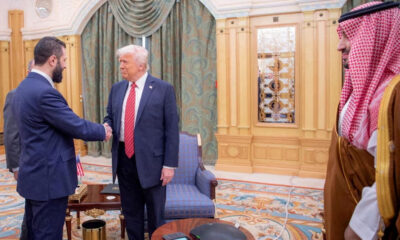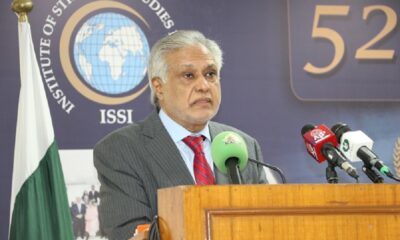Latest News
Qatar to host two-day Doha process working meetings on Afghanistan
The Doha Process has emerged as a key diplomatic platform following the Taliban’s (IEA) return to power in August 2021.

Qatar is set to host a two-day round of meetings under the United Nations-led Doha Process focused on Afghanistan, beginning Monday, June 30.
The sessions will include the third Working Group Meeting on Counter-Narcotics and the second Working Group Meeting on Private Sector Support in Afghanistan, according to Alya Ahmed bin Saif Al-Thani, Qatar’s Permanent Representative to the United Nations.
In a statement, Ambassador Al-Thani confirmed that the meetings, scheduled for June 30 to July 1, will bring together representatives from the Afghan caretaker government, participating countries in the Doha Process, and technical experts.
“These two meetings are part of the broader framework of the Doha Process, and Qatar is honored to host and support UN-led efforts aimed at strengthening regional and international engagement with Afghanistan,” said Al-Thani.
The Doha Process has emerged as a key diplomatic platform following the Taliban’s (IEA) return to power in August 2021.
It aims to facilitate structured dialogue between Afghanistan’s de facto authorities, the international community, and relevant stakeholders.
To date, three high-level rounds of the Doha Process have been held.
The most recent, in July 2023, saw participation from a delegation of the Islamic Emirate of Afghanistan led by its spokesperson, Zabihullah Mujahid.
The working group meetings now scheduled are part of the outcomes agreed upon during that third Doha meeting.
While the United Nations and Qatar have officially confirmed the agenda and participants for the working groups, the Islamic Emirate has not yet issued any statement on who will attend from the Afghan administration.
Qatar has reiterated its commitment to playing an active role in facilitating dialogue and international coordination around Afghanistan. “We take pride in hosting these talks in Doha and in supporting the United Nations in its leadership role,” said Al-Thani.
Latest News
Senior Afghan delegation, led by deputy PM Baradar, in Azerbaijan for ECO Summit
During the two-day summit, scheduled for July 3–4 in Baku, Baradar is expected to deliver a keynote address at the ECO’s general session.

A high-level delegation from the Islamic Emirate of Afghanistan (IEA), led by Deputy Prime Minister for Economic Affairs Mullah Abdul Ghani Baradar, departed Monday morning to participate in the 17th Summit of the Economic Cooperation Organization (ECO) at the invitation of the government of Azerbaijan.
During the two-day summit, scheduled for July 3–4 in Baku, Baradar is expected to deliver a keynote address at the ECO’s general session, alongside other heads of state and senior officials from member countries.
In addition to his participation in the summit’s official proceedings, Baradar will also hold bilateral meetings with Azerbaijani government officials to discuss strengthening cooperation between the two nations across various sectors, including trade, transit, and regional connectivity.
The 17th ECO Summit aims to enhance regional economic integration and collaboration among member states in areas such as infrastructure development, energy, transportation, and investment.
Latest News
Trump signs order lifting sanctions on Syria, White House says
Some in Congress are pushing for the measures to be totally repealed, while Europe has announced the end of its economic sanctions regime.

President Donald Trump signed on Monday an executive order terminating a U.S. sanctions program on Syria, allowing an end to the country’s isolation from the international financial system and building on Washington’s pledge to help it rebuild after a devastating civil war, Reuters.
The move will allow the U.S. to maintain sanctions on Syria’s ousted former president Bashar al-Assad, his associates, human rights abusers, drug traffickers, people linked to chemical weapons activities, the Islamic State and ISIS affiliates and proxies for Iran, White House spokeswoman Karoline Leavitt told reporters in a briefing.
Assad was toppled in December in a lightning offensive by Islamist-led rebels and Syria has since taken steps to re-establish international ties.
Syrian Foreign Minister Asaad al-Shibani said Trump’s termination of the Syria sanctions program would “open door of long-awaited reconstruction and development,” according to a post by the foreign minister on social media platform X.
He said the move would “lift the obstacle” against economic recovery and open the country to the international community.
Syria’s President Ahmed al-Sharaa and Trump met in Riyadh in May where, in a major policy shift, Trump unexpectedly announced he would lift U.S. sanctions on Syria, prompting Washington to significantly ease its measures.
Some in Congress are pushing for the measures to be totally repealed, while Europe has announced the end of its economic sanctions regime.
“Syria needs to be given a chance, and that’s what’s happened,” U.S. Special Envoy for Syria Thomas Barrack told reporters in a briefing call. He described Monday’s move as “the culmination of a very tedious, detailed, excruciating process of, how do you unwrap these sanctions.”
The White House in a fact sheet said the order directs the Secretary of State to review the terrorism designations of Hayat Tahrir al-Sham, a rebel group that Sharaa led that has roots in al Qaeda, as well as Syria’s designation as a state sponsor of terrorism, read the report.
The White House said the administration would continue to monitor Syria’s progress on key priorities including “taking concrete steps toward normalizing ties with Israel, addressing foreign terrorists, deporting Palestinian terrorists and banning Palestinian terrorist groups.”
A Reuters investigation published on Monday revealed the role of Syrian government forces in the killing of more than 1,500 Syrian Alawites over three days of massacres along the country’s Mediterranean coast in March. The Trump administration had no comment on the Reuters report.
It was not immediately clear if Washington was lifting the sanctions on any of the factions that Reuters found were involved.
Syrians hope the easing of sanctions will clear the way for greater engagement by humanitarian organizations working in the country, encouraging foreign investment and trade as it rebuilds.
In the aftermath of Trump’s announcement in May, the U.S. Treasury Department issued a general license that authorized transactions involving the interim Syrian government as well as the central bank and state-owned enterprises, Reuters reported.
However, the U.S. has imposed layers of sanctions against Syria, some of which are authorized by legislation, including the Caesar Act. Repealing the measures is necessary for Syria to attract long-term investment without parties fearing the risk of violating U.S. sanctions.
“We are now, pursuant to the executive order, going to look at suspension criteria for the Caesar Act,” a senior administration official said.
Most of the U.S. sanctions on Syria were imposed on Assad’s government and key individuals in 2011 after civil war erupted in the country.
The dismantling of the U.S. sanctions program on Syria includes terminating from Tuesday a national emergency declared in 2004 and revoking linked executive orders, according to the order signed on Monday.
The executive order also directs additional actions, including some with respect to waivers of export controls and other restrictions, the order read.
Latest News
Pakistan expects IEA to prevent cross-border terrorism: Dar

Mohammad Ishaq Dar, Deputy Prime Minister and Foreign Minister of Pakistan, has emphasized that the Islamic Emirate of Afghanistan (IEA) must ensure Afghan soil is not used for terrorist activities against Pakistan.
Speaking at the 52nd anniversary of the Institute of Strategic Studies Islamabad (ISSI), Dar highlighted recent efforts to improve Pakistan-Afghanistan relations. Referring to his visit to Kabul and the China-Pakistan-Afghanistan trilateral foreign ministers’ meeting in Beijing, he stated that these engagements have paved the way for a positive and qualitative shift in bilateral relations.
He noted that both sides agreed to upgrade diplomatic representation to the ambassadorial level and to extend the China–Pakistan Economic Corridor (CPEC) into Afghanistan.
However, the Foreign Minister stressed: “Having made sincere efforts in Afghanistan’s interest, it is our legitimate expectation that the Afghan Interim Government would take all steps necessary to ensure that Afghanistan’s soil is not used for terrorism against any state, particularly Pakistan.”
He added that this is not only in Pakistan’s interest but also directly benefits Afghanistan, as it would strengthen internal security and improve relations with neighboring countries, particularly Pakistan.
Dar emphasized that genuine cooperation from the Afghan authorities could lead to wide-ranging benefits in terms of economic development, regional connectivity, and shared prosperity—benefits that would extend beyond Afghanistan to Central Asia and other regions.
This comes as the Islamic Emirate has repeatedly rejected claims by Pakistani officials that Afghan soil is being used for attacks against Pakistan, asserting instead that Pakistan’s insecurity is an internal issue.
-

 Latest News5 days ago
Latest News5 days agoBayat Power showcases clean energy achievements and vision at Kabul’s Green Growth Forum
-

 Latest News5 days ago
Latest News5 days agoIEA following up on vicious attack of Afghan child at Moscow airport
-

 Latest News4 days ago
Latest News4 days agoUN urges immediate international aid for returning Afghan refugees
-

 Latest News5 days ago
Latest News5 days agoPakistan’s health minister to visit Kabul
-

 Latest News4 days ago
Latest News4 days agoPrivate sector and UN officials emphasize boosting renewable energy investment in Afghanistan
-

 Sport4 days ago
Sport4 days agoAFPL: Perozi Panjshir, Noorzad FC claim wins in 37th and 38th matches
-

 Regional4 days ago
Regional4 days agoUS talks to Pakistan about promoting ‘durable peace between Israel and Iran’
-

 Science & Technology4 days ago
Science & Technology4 days agoInternational Space Station welcomes first astronauts from India, Poland and Hungary
























